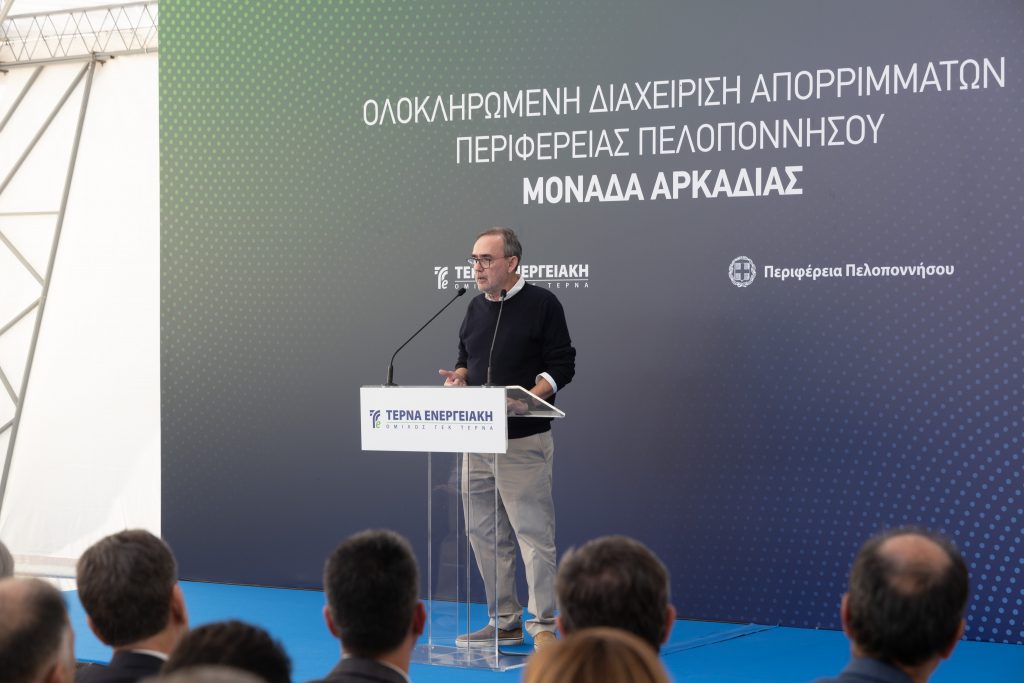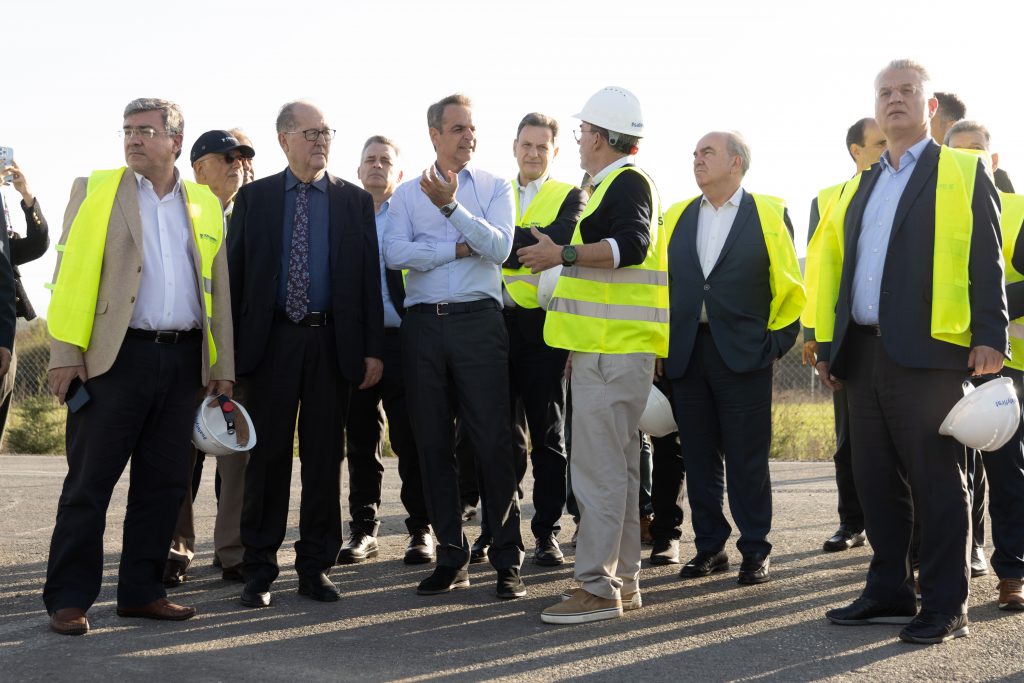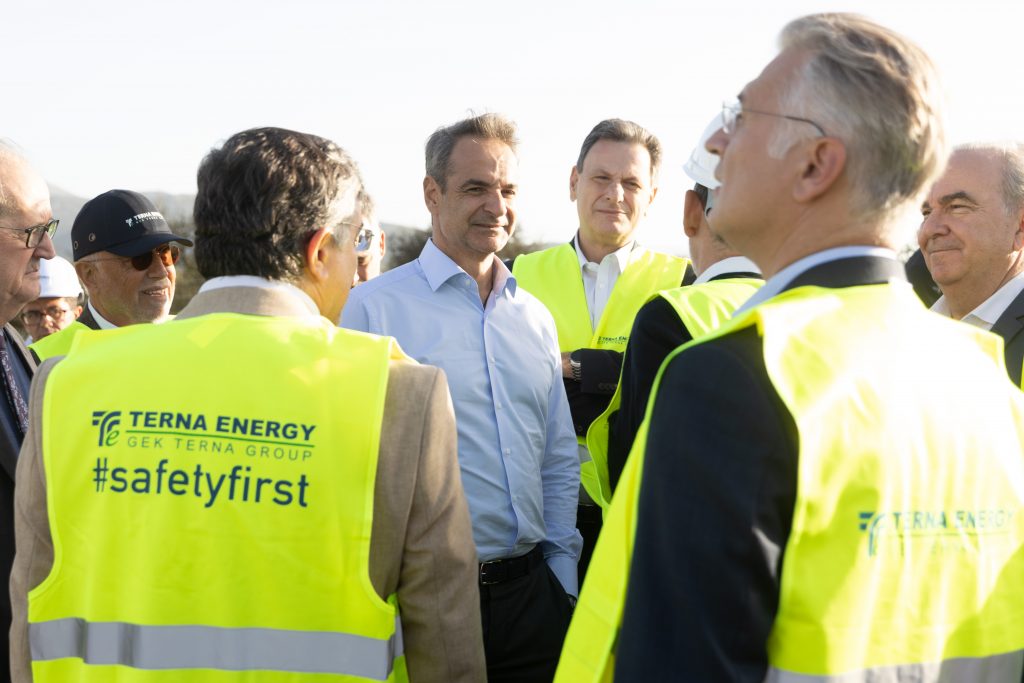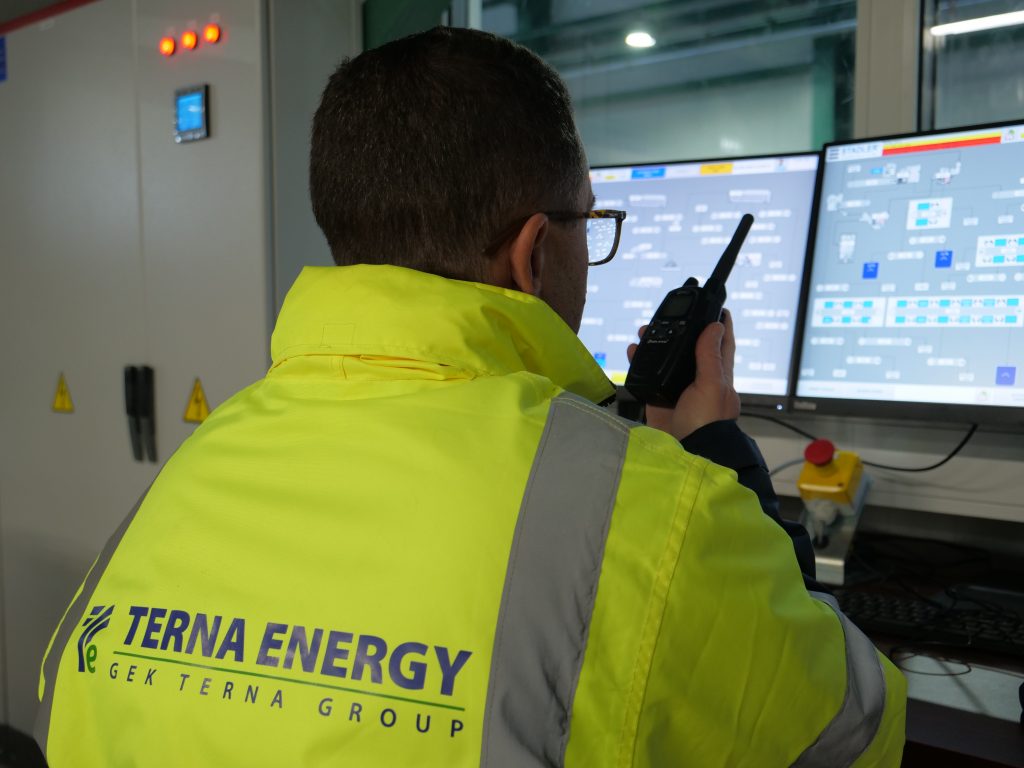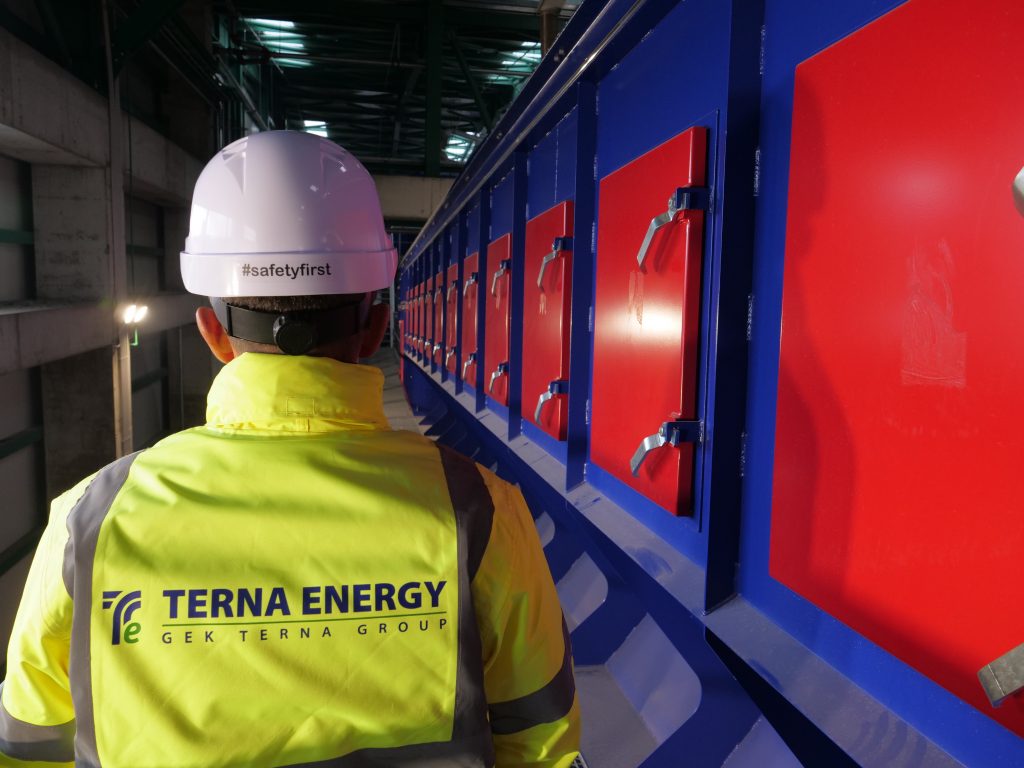Corporate News
The presentation of the most modern Waste Processing Unit in the country took place in the presence of the Prime Minister, in Palaiochouni, Arcadia.
From being a laggard in waste management, the Region of Peloponnese has now become a national champion, having the three most modern Waste Management Units in Greece and among the most modern in Europe.
By implementing an investment of €167 million (€70 million funded by ESPA), the Region of the Peloponnese is entering the era of circular economy, recovering and utilizing over 80% of biodegradable materials, recycling high-quality recyclables, diverting at least 50,000 tons of liquid waste from landfills, and generating green energy to meet the needs of 6,000 households, while simultaneously avoiding the emission of 24,000 tons of carbon dioxide into the atmosphere.
Already, the largest of the three units, the Arkadia Waste Processing Unit, successfully manages more than 50% of the urban solid waste produced in the Peloponnese Region. The remaining 50% is currently undergoing processing at the Transitional Units in Messinia and Laconia, which are expected to be in full operation by 2024.
In the few months since its full operation, the employees of Arkadia’s Waste Processing Unit with the assistance of modern technology have managed to handle waste quantities greater than conventional maximums, highlighting the significant need for effective waste management in the Peloponnese Region. Furthermore, in the short time of integrated management at the Arkadia Waste Processing Unit, in addition to the successive records of conventional performance, the Region was completely relieved of the European fines related to past illegal practices. Moreover, by utilizing cutting-edge technology, it manages to offer the lowest operational cost among all similar Waste Management Facilities (PPP) in the country, a cost that will be further reduced with the operation of the Green Fund and when the network of Waste Transfer Stations (WTA) is completed by FODSA, offering significant savings to the citizens of the Peloponnese.
These figures, among others, were presented today at a special event held in the presence of the Prime Minister Mr. Kyriakos Mitsotakis, as well as the Minister of Environment and Energy Mr. Th. Skylakakis, the Deputy Minister of National Economy and Finance Mr. N. Papathanasis, the Deputy Minister of Culture Chr. Dimas, the General Secretaries of Public Investments and PADF (Partnership Agreement for the Development Framework), Mr. D. Skalkos and Waste Management Coordination Mr. Em. Grafakos and the Special Secretary for Regional Development Fund and Cohesion Fund Program Management, Mr. G. Zervos.
“It is indeed a great day for Peloponnese, I believe, with a project which is literally changing its life. The wretched landfills, the volumes of garbage that threatened public health, altering the unique nature of this place, are now a thing of the past”, stated the Prime Minister, Mr. Kyriakos Mitsotakis, in his greeting. “This unit not only frees the Region from the hoarseness of the environmental burden, at the same time it relieves taxpayers from burdens of millions of euros, which entailed – I want to remind you – the continuous fines of the European Union in our country. At the same time, it will offer clean, cheap energy, creating new markets at the same time for recyclable materials, for secondary fuel. The implementation of the integrated plan for waste management in the Peloponnese puts an end to a chronic problem for the region, which in 2019 had only one legal landfill while at the same time there were dozens of uncontrolled waste disposal sites. With the new data, it is estimated that the Peloponnese will be one of the first Regions to achieve the goal of the National Waste Management Plan to reduce the burial rate below 10% by 2030. For the period 2021-2027, funding for waste treatment plants of the order of €600 million has been secured, although this was not originally foreseen. This fact essentially contributes to the completion of the network of modern units for waste throughout Greece. A total of €600 million will be allocated to complete waste management across the country. And this while no corresponding European funding was foreseen. We are therefore talking about a coordinated initiative inside and outside the borders”, said Mr. Kyriakos Mitsotakis.
From his part, the Regional Governor of Peloponnese, Mr. Panagiotis Nikas, stated: “We have taken a big step in the Peloponnese, with the operation of the three Waste Management Units and two Waste Transfer Stations for the 26 municipalities of the Region”, the regional governor Panagiotis Nikas pointed out among other things in his greeting, that the development and completion of the project was based on the “long-term effort of the Region, the common understanding with FODSA and the effective”– as he noted – “collaboration of the Periphery with TERNA Energy In conclusion, the regional governor of Peloponnese P. Nikas thanked the Prime Minister Kyriakos Mitsotakis, the European Commission and Karsten Rasmussen “for their understanding and contribution to solving serious problems”.
The President of TERNA Energy, Mr. Giorgos Peristeris, spoke about the decisive role that integrated waste management plays in the protection of public health, the environment, as well as in upgrading the quality of life and the tourism product in the Peloponnese, while he also made special mention of contribution of the PPP institution to the implementation of these projects: “Public health and the environment of the Peloponnese have already benefited immeasurably from this investment, while the benefits will only multiply as the years pass. The Peloponnese can, with the pride that characterizes it historically, declare that it has the most modern integrated waste management system in Greece and one of the most advanced in Europe. We are honored to underwrite this great project, leveraging the expertise we have developed both in the implementation of waste management projects in Greece, and in the design, financing, construction and operation of PPP projects. The integrated waste management of Peloponnese is the living proof of how much great things can be done when the state and business join forces and cooperate by offering each side its comparative advantages to a common goal”.
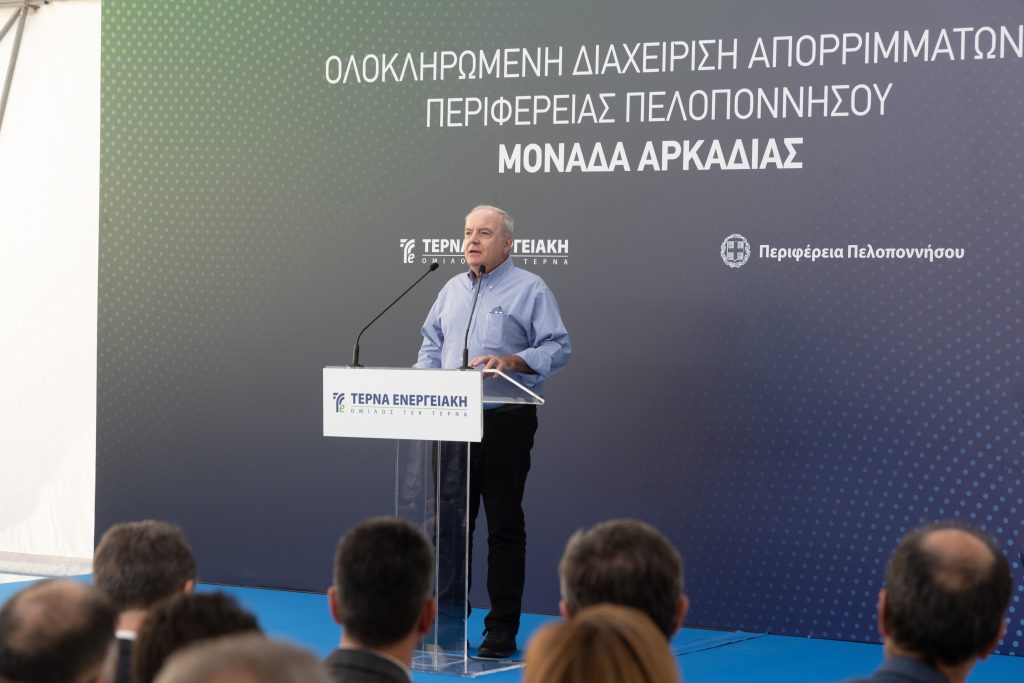
Information on Integrated Waste Management in the Peloponnese Region
On 14.06.2018, the Partnership Agreement for the implementation of the Project was signed between the Region of Peloponnese and the company “PERIVALLONTIKI PELOPONNISOU MONOPROSOPI ANONYMI ETERIA” (a subsidiary of TERNA Energy), which came into force on 29.01.2021.
The Project is developed in three (3) Subsections – Management Units of the Peloponnese Region, and includes:
The TMUs/WMUs-SLSs are located in Arkadia, Messinia, and Laconia, while the WTSs are in Corinth and Argolis. This ensures that waste collection occurs within a distance of less than 50 kilometers from the regional capitals, minimizing the transportation needs from the municipalities.
The project, by using state-of-the-art technology has the minimum possible environmental and energy footprint, implements most of the Peloponnese Regional Waste Management Plan, operates alongside and in addition to the Local Recycling Programs of municipalities, and applies the best practices when it comes to the principles of circular economy.
In the context of this project, 800 jobs have already been created during the construction period and 200 permanent jobs will emerge during the operating period, i.e. for the next almost 30 years (27 years). These benefits in terms of employment do not include the indirect jobs and benefits that will be generated from the operation of the project in the area (in areas such as transport, trading of recyclables, accommodation of personnel etc.).
